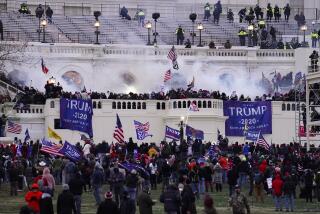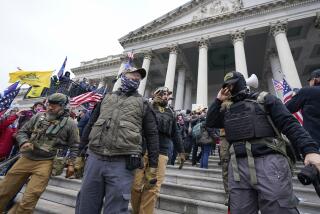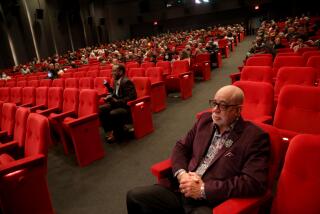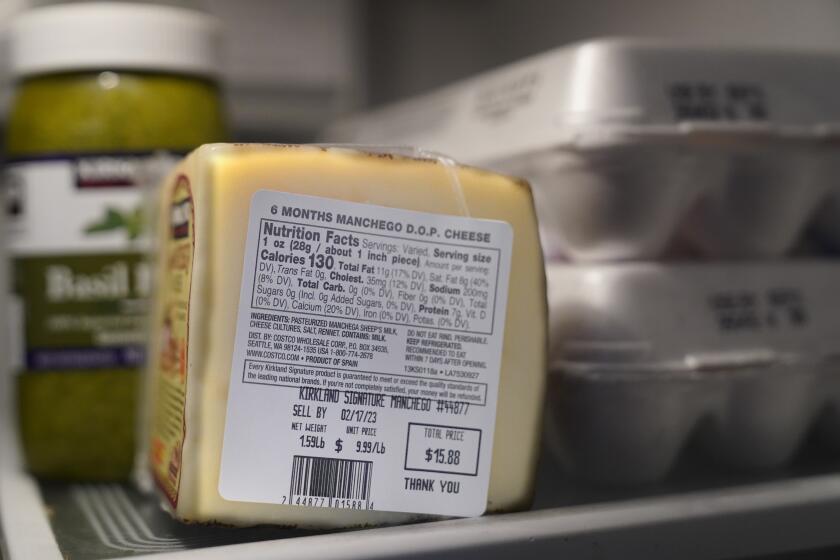Column: The flag, the military, police shootings, the NFL and Trump get the barbershop treatment at Tolliver’s
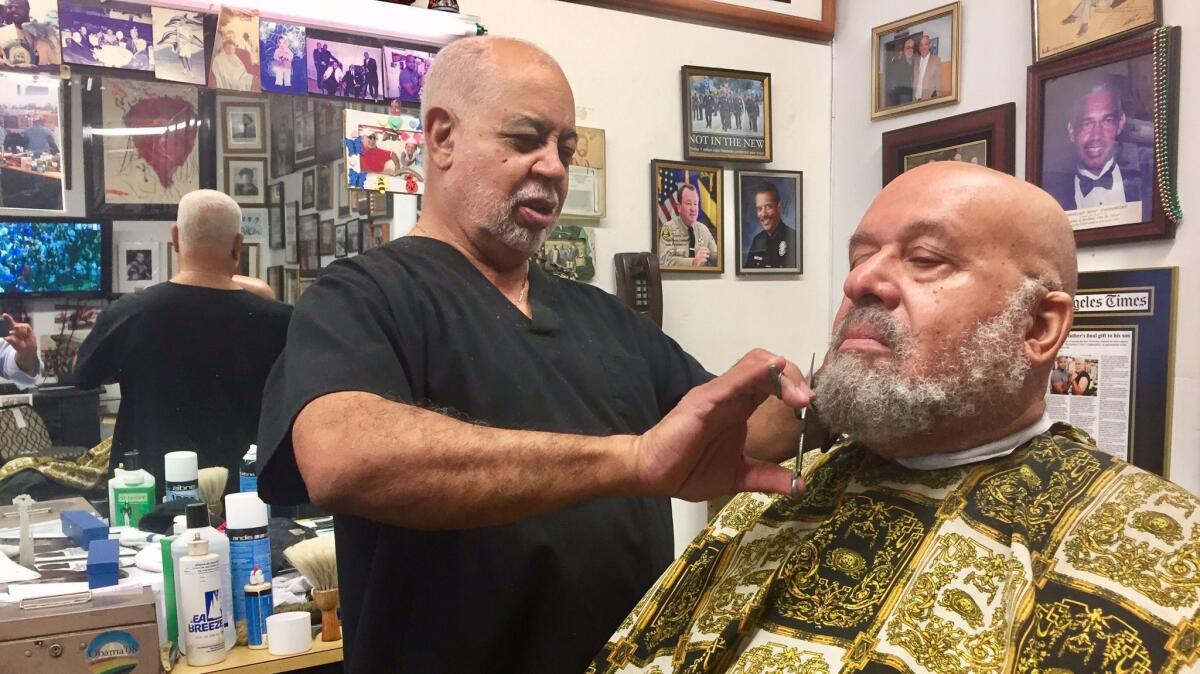
“Do you notice anything different?” Lawrence Tolliver asked Thursday when I walked into his South Los Angeles barbershop.
Yes, as a matter of fact. He’s really cleaned the place up.
Tolliver’s always had photos of his heroes on the walls, but he’s added many more to the collection, turning the clip shop into a museum. There’s Nelson Mandela, Rosa Parks, Muhammad Ali, Barack Obama, Martin Luther King Jr. and many, many more African American athletes and leaders.
And also, the last two chiefs of the LAPD and the current L.A. County sheriff — all of whom are white. Tolliver’s son is a police officer, and lots of his customers are in law enforcement too.
So given the whole take-a-knee controversy in the NFL, and President Trump attacking players and the league for dishonoring the country, as he sees it, I figured it was time to drop in on the conversation at Tolliver’s.
When I got there, CNN was running a story about the controversy over Trump’s phone call to the widow of African American Sgt. La David T. Johnson, one of four U.S. servicemen killed in Niger.
Rep. Frederica S. Wilson (D-Fla.), also African American, had overheard the Trump call. She agreed with the widow that the president’s choice of words, in the midst of a wrenching tragedy, was inappropriate.
Before long, Trump was accusing the lawmaker of fabricating her account of his conversation with the widow. He followed that up by claiming, “If you look at President Obama and other presidents, most of them didn’t make calls.”
That isn’t true. But at this point, yet another fabrication from the man who keeps screaming about fake news is not a surprise. And to the regulars at Tolliver’s, it wasn’t a surprise that Trump had accused a black congressional representative of lying and dragged a black former president into the conversation.
“It’s sick,” said Drew Palmer, who thinks Trump is obsessed with Obama. “He tries to erase and obliterate every part of history Obama has touched.”
If you ask me, personal attacks are part of Trump’s nature — and also part of his plan. Maybe kicking sand in people’s faces blinds some, momentarily, to the fact his self-proclaimed deal-making powers have not delivered a fraction of the fast-and-furious fixes he promised.
Trump’s obsession with Obama goes way back. For years, he led the charge in insisting Obama was not a U.S. citizen. Long after such claims had been dismissed by most people as a crackpot conspiracy, Trump kept insisting the first black president of the U.S. was African.
“And he never apologized,” Palmer said.
Carter Paysinger said that when more NFL players began kneeling this season during the national anthem as a statement against injustice in minority communities, the language of Trump’s criticism caught his attention. Trump said a player who kneels during the anthem is a “son of a bitch” who should be fired, and the NFL should tell them to stand.
“That brings you back to slavery,” said Paysinger, a former high school principal. “Tell them to stand up goes deeper than what it sounds like.”
“And we all hear the dog whistle,” said Palmer, arguing that Trump seemed more offended by “black people kneeling for a cause” than by white supremacists rallying in Charlottesville, Va.
On the subject of kneeling during the anthem, Tolliver had this to say:
“I would never do it.
“I hold the flag in high regard,” said Tolliver, but he would “never let anyone tell me what the American flag represents.” He was in ROTC in high school, Tolliver said, and he proudly handled the daily duty of raising and lowering the flag.
“But if they wanna protest, they can do it,” Tolliver said. “That’s what America is.”
The kneeling actually began after a Green Beret convinced former quarterback Colin Kaepernick that kneeling, as soldiers do before fallen comrades, would be more respectful than sitting during the anthem.
“To me, they’re not protesting the flag,” Palmer said. Nor, in his opinion, are players dishonoring those who served the country.
As he spoke, a story on Arizona Republican Sen. John McCain aired on TV.
“That man there is trying to stick up for what’s right,” Tolliver said.
“That’s a war hero,” said Palmer, who brought up that Trump — who did not serve in the military — had taken a shot at McCain for having been captured during the Vietnam War.
McCain, who was tortured, refused to use family connections to win early release, telling his captors he wouldn’t leave his crew behind. Trump said during the presidential campaign that McCain wasn’t a hero.
“If you’re a military person, in my humble opinion, and you support Trump after that statement right there, I have no respect for you,” Palmer said.
He cited Rosa Parks and other African Americans who, throughout history and despite the risks, had said enough is enough. You don’t have to be the perfect spokesman or most brilliant visionary to take such a stand, Palmer said. You don’t even have to be a leader. It’s enough to be faithful to your own conscience.
Those who kneel, he said, are drawing attention to social and economic conditions in minority communities and saying they cannot tolerate the loss of black lives in questionable police shootings.
“Being a police officer is a dangerous job,” Tolliver said. “I would give a little leeway to officers who may be in a borderline situation. Your life is on the line and you say: ‘I wanna get home tonight.’ But there are shootings that are completely outrageous.”
I asked if it was fair for some to suggest that civil rights leaders and protesters ought to be at least as outraged by all the lives lost to black-on-black crime. Is that not a cause worth kneeling for?
Two different issues, Palmer said.
William Taylor, whose family ran a furniture store in the neighborhood for years, said those losses are tragic, but police officers are public servants whose misdeeds have to be addressed. And yet, prosecutions are relatively rare.
“If you took a bunch of white kids and put them in the same conditions these kids in Chicago have to live in, they’d kill each other too,” said Rev. Jerrold Smith of Los Angeles Third Church of Spiritual Living.
“With black-on-black crime, that’s bred for centuries and centuries, just like the racist attitudes we’re talking about. I’m not excusing it, and I believe we should march and raise hell and protest every time a black man gets killed by a black man, just like we do when a black man is killed by police.”
But the focus, Smith said, should be on the conditions that foster the loss of so many lives.
That was another campaign promise, as I recall. Trump was going to bring prosperity and safety to America’s inner cities.
If you’re waiting on the details of that plan, do not stand, because it could take a while.
Better to take a knee.
Get more of Steve Lopez’s work and follow him on Twitter @LATstevelopez
More to Read
Sign up for Essential California
The most important California stories and recommendations in your inbox every morning.
You may occasionally receive promotional content from the Los Angeles Times.

